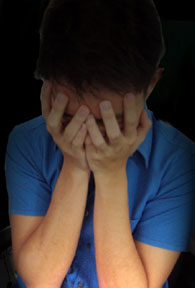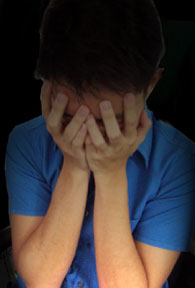The issues of having multiple sexual partners, the availability of casual and anonymous sex are not new to the gay community. Not only has it been around for ages, I dare say it has become more rampant in this day and age where promiscuity is not just accepted, but even embraced. However, not many of these who embrace this realise that their need for sex is merely "a compulsive need to compensate for the emptiness inside". It is really a symptom of a larger, little recognised problem, stemming from feelings of worthlessness and low self-esteem.

If the above hasn't really caught you in mid- breath, then the following should. If you are gay, lesbian or transsexual, you are three times more likely than your straight peers to commit suicide, and among all completed teen suicides, you account for 30% of it. In the United States, it is estimated that every six hours, another gay, lesbian or transgender young person takes his or her own life. Those are the sad consequences of the higher prevalence of depression and low self-esteem issues most gays and lesbians struggle with for most of their lives.
All these are accurately reflected in an online survey conducted by Gay Health.Com in which gays and lesbians ranked depression as the top health concern, even above AIDS. Results show that we are roughly two times more likely than our straight counterparts to be concerned about depression. And as one community report stated, "it is easy to imagine that discrimination coupled with limited support for gays and lesbians could explain the higher prevalence of depressive illness within the gay and lesbian community."
Sadly, we do have reason to be concerned. To really understand the reasons behind why we are prone to suffer from low self-esteem and self-worth, one has to go much deeper.
Gays and lesbians are no different from heterosexuals in relation to being depressed due to low self-esteem. However, what differentiates our depression from theirs is that very often, because of discrimination and rejection arising from our sexual orientation, we often grow up feeling isolated, feeling that we are 'wrong', and do not get enough support and corrective reinforcement. The ongoing discrimination as we grow up in the world together with the lack of support 'adds significant stress to our lives and eats away at our sense of self-worth and self-esteem'. We become vulnerable to feelings of depression.
The discrimination we face from society is perhaps not the kind that sees skinheads outside your window throwing bricks in, but more subtle things like legal and social discrimination. In many countries across the world, homosexual behaviour is still considered to be illegal (in several Muslim states it is actually a capital offence). Various laws prevent a homosexual couple from having kids, sharing a house, even health insurance, basically not recognising their union in any way.
Social discrimination could also take place in form of religious discrimination. Many religions still consider homosexuality as a "sin" and most gay and lesbian couples face rejection from religious organisations. In fact, some gays and lesbians suffer from feelings of worthlessness due to the religious belief that one would be condemned to hell because of their sexual orientation.

Many psychologists and counselors argue this social isolation may stem from certain factors in childhood and quote numerous studies to prove as such.
A study even concluded that a lack of social support systems contributed and even strongly predicted social isolation and low self-esteem, which resulted in psychological distress.
Many believe that because our present society is homophobic (or at least does not promote homosexuality), society's ideas about the homosexuality is not positive. Consequently, many of us grow up listening and accepting that most homosexuals are 'bad', cannot form mature non-erotic relationships, and, perhaps more recently, are the 'cause' of AIDS.
There are few gay or lesbian role models, dating norms or even models of gay and lesbian relationships available for us to look up to. The mere association with someone who is gay may bring stigma upon oneself, let alone attempting to date someone who is. The stereotypical "masculine" or "feminine" behaviour is imposed upon most of us in our youth, and any 'non-conforming' behaviour severely discouraged by those around us.
In many cases, this may result in feelings of real or imaginary "parental rejection", all the while repressing one's need of intimacy. Many people thus do not come out of the closet for most of their lives, afraid that society, and their parents, friends, co-workers etc. will judge and not accept them for who they are.
As a consequence, many of us grow up with identity disorders, "involving a negative sense of self-worth and seeking out relationships that reinforce one's sense of worthlessness". These can range from a refusal to come out to a tendency to enter abusive relationships, and others.
Left unattended, feelings of low self-esteem and self-worth can disrupt one's life to the extent that one gets depression, and basic functions such as sleeping and eating become every difficult. Depression hinders one from leading a satisfying and healthy life, and affects everyone around you. Untreated, it often leads to suicide (depression is THE number one cause of suicide). Frequently, a slow accrual of feelings of helplessness leads to suicide - all the hurts and feelings of worthlessness add up over the years; and the resultant action is thus not an impulsive one.
Someone suffering from depressive illness will exhibit the following common symptoms:
· a prolonged depressed mood
· decrease or increase in appetite
· significant weight loss or gain
· insomnia
· fatigue or loss of energy
· excessive or inappropriate guilt
· recurrent thoughts of death
· social withdrawal
· lack of interest or pleasure
· difficulty thinking or concentrating
· suicidal ideation or attempt
· unresolved grief
· use of substance abuse
· often shows refusal to seek help, or failure to recognise something IS wrong
How do we break out of the cycle then? The first step one can take is to have awareness - do you know which part of your life adds to your self-esteem and self-worth as a gay or lesbian person? Are you, in fact, proud to be gay or lesbian? Are you comfortable in your personality and life, or do you constantly feel insecure about yourself? Once you truly realize where you stand, you're on your way.
Very often, your level of "outness" determines how you see yourself. People who are insecure about their sexuality often feel a need to prove to themselves and to others that they are 'normal', and they generally see living a lie as their only option.
Life is full of hardship and conflicts, obstacles and losses leading to frustration and hurt feelings. However, the 'hallmark of a happy, healthy and satisfying life is not one void of conflict and loss, but rather one where you can successfully manage such issues when they arise'. How you deal with what comes your way largely determines, in the end, the quality and satisfaction of your life.
Don't ever be afraid to accept help and support from others, be it from friends or professional help. You must never undermine what a support system can do for your life.
Accept that we aren't able to control everything around us. It is a fact that we face a tougher life than our straight counterparts, but make the best out of it, create some sense in the turmoil.
Being overly critical of yourself, setting high, unrealistic expectations, blaming yourself for your sexual orientation, your waistline, not being in a relationship, etc, etc, all don't help you in anyway. So STOP beating yourself up! Setting realistic, attainable goals you can achieve is one way of improving your self-esteem (for example don't consider starving for a month just so you can shrink two sizes to fit into that gorgeous pair of Calvin Klein pants). Acknowledge the good in yourself and take care of yourself - you deserve it.
